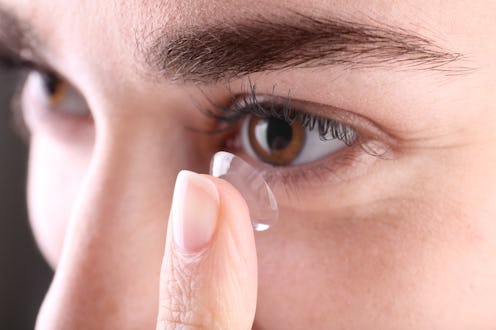
If you're a contact-lens wearer, you might think the invention of long-wear contacts is the best thing ever. But just how long should your keep contacts in? If your answer is forever, I have bad news. Long-term use of contact lenses can lead to eye calluses, which is just as gross as it sounds. While extended-wear lenses are super convenient, information from the National Research Council found that people who swap out their contact lenses each day are 10 times less likely to develop eye complications that can lead to corneal ulcers, calluses, edema, cysts, dehydration, and more.
"A controlled case study has shown that the relative risk of ulcerative keratitis is 10 to 15 times as great for users of extended-wear lenses as for users of daily wear lenses," the report noted. In addition, a study published in the journal Clinical Optometry found that people who use extended-wear lenses and sleep in them are at a much higher risk of eye damage than those who remove their lenses daily.
There are many conditions people refer to as eye calluses or eye ulcers, but microbial keratitis, which can occur in people who use long-wear lenses and don't practice good eye-hygiene, smoke, or buy their lenses from a non-reputable source, is not to be taken lightly. "Microbial keratitis is a very serious condition. It usually begins suddenly with redness and pain in one eye. The eye waters and there may be a discharge. Light may hurt the eye, making it difficult to open. The vision of the eye may be blurred," The College of Optometrists explained on its website.
"The optometrist will usually observe an area in the cornea where the clear tissue has been turned cloudy by infection. There may be an ulcer on the surface. The inflammation extends into the chamber at the front of the eye also." The infection can be bacterial or fungal, and untreated — aside from being gross — it can cause serious eye damage, including blindness.
But that doesn't happen in 2018, you might be thinking. Unfortunately, it does. While there have been advances in most areas of modern life, the Clinical Optometry study, published in 2016, found that the incidence of microbial keratitis related to contact lenses hasn't changed much since 1986.
On the less serious but equally gross side, if your contact lenses dry out your eyes, you could be at risk for developing pinguecula and pterygium, which are callus-like patches or bumps that can grow on your eyeballs. According to the American Academy of Ophthalmology, a pinguecula presents as a yellowish callus on your eye, and it's actually a deposit of protein, fat, or calcium.
Left untreated, it can develop into a pterygium, a growth of fleshy tissue that can eventually cover the cornea and cause blurred vision. Even if it's removed, a pterygium grows back in up to 40 percent of patients and is most common in people under 40. Sounds pretty unpleasant, right? If you want to reduce your chances of getting a serious eye callus, make sure you understand the risks that accompany each type of contact lenses.
Daily wear lenses are meant to be worn during the day and removed each night for cleaning, Georgia-based Piedmont Healthcare explained on its website. These lenses carry the lowest risk. The second kind of contact lenses are disposable, which are daily lenses that are thrown out each night, or lenses that are removed each day and cleaned and replaced every two weeks with a fresh pair.
The third kind of contact lenses carry the greatest risk. Extended wear lenses are worn 24/7 for one-to-four weeks before being removed and replaced. If you want to minimize your risk, there are some things you can do. "The FDA recommends that extended wear contact lenses be removed and not worn overnight at least once a week," Evan Loft, M.D., an ophthalmologist at Piedmont noted. "Overnight wear of contact lenses is the main risk factor for developing corneal ulcers."
If you live in an area with high air pollution, you smoke or spend time around smokers, or your eyes are super dry, make sure you're spending time without your contacts in, and definitely don't sleep in them. Talk all of the options over with your doctor so you can make an informed decision about what's best for your eyeballs. #TheMoreYouKnow